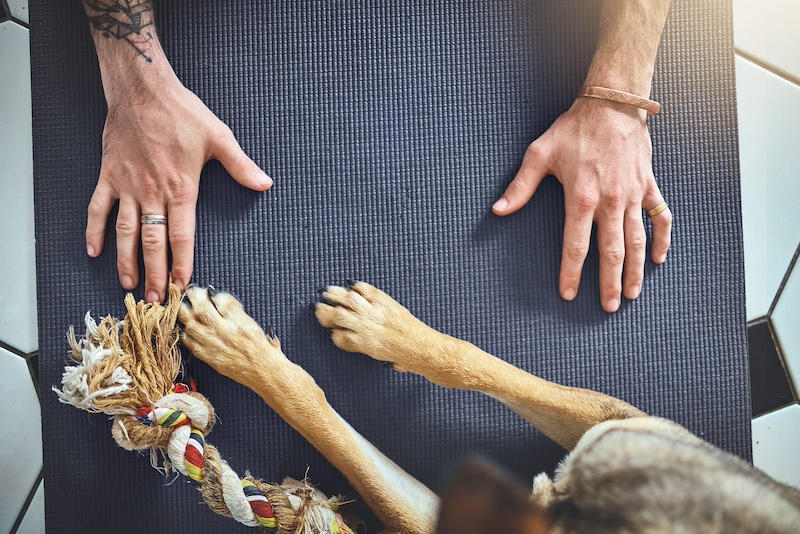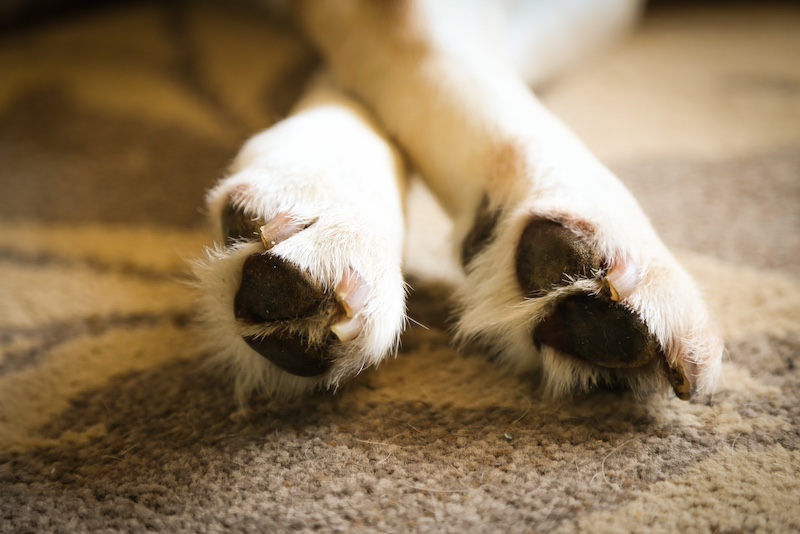If you’ve ever snuggled up with your dog and caught a whiff of something oddly familiar emanating from their paws, you’re not alone. Many dog owners have noticed that their dog’s feet often smell like corn chips or popcorn. This peculiar phenomenon even has a name: “Frito Feet.” But what causes this curious aroma? Let’s get into into the science and factors behind why your dog’s feet smell like corn chips.
The Microbiome of a Dog’s Paw
At the heart of the corn chip smell is the unique microbiome of your dog’s paws. Just like humans, dogs have a complex ecosystem of bacteria and fungi living on their skin. The specific mix of microorganisms on a dog’s feet, including bacteria such as Proteus and Pseudomonas, are responsible for the characteristic scent. These bacteria thrive in the warm, moist environment of your dog’s paws, particularly between the toes where sweat can accumulate.
The Role of Sweat Glands

Dogs primarily sweat through their paw pads, as they lack the extensive network of sweat glands that humans have. The sweat glands in a dog’s paws secrete a mixture of water, salt, and other compounds. When bacteria on the skin break down these secretions, they produce by-products that can emit a variety of smells, including the corn chip aroma. This process is similar to how bacteria on human skin can cause body odor.
Environmental Factors
Several environmental factors can influence the intensity and presence of the corn chip smell on your dog’s feet. These factors include:
Moisture and Humidity
Dogs that frequently walk on wet grass, play in puddles, or live in humid environments are more likely to have Frito Feet. The increased moisture creates an ideal breeding ground for bacteria and fungi, amplifying the scent. Even if your dog stays mostly indoors, a humid home can contribute to the development of the smell.
Dirt and Debris
Paw pads are like sponges for dirt and debris. Tiny particles of soil, grass, and other materials can get trapped in the crevices of your dog’s feet. These particles provide additional nutrients for bacteria, enhancing their growth and the resulting smell. Regularly cleaning your dog’s paws can help minimize this effect.
Diet
Believe it or not, what your dog eats can also impact the smell of their feet. Certain foods can alter the chemical composition of your dog’s sweat, leading to different scents. High-carbohydrate diets, for example, might contribute to a more pronounced corn chip smell. Ensuring a balanced diet with appropriate nutrition can help maintain a healthier skin microbiome.
Health and Hygiene Considerations
While the corn chip smell is generally harmless, it can sometimes indicate underlying health issues or poor hygiene. Here are some considerations to keep in mind:
Infections
If the smell becomes particularly strong, or if your dog’s paws are red, swollen, or causing them discomfort, it could be a sign of an infection. Bacterial and fungal infections can exacerbate odors and require prompt veterinary attention. Symptoms like excessive licking, chewing, or limping should not be ignored.
Allergies
Dogs with allergies, whether environmental or food-related, are more prone to skin irritations and infections. These conditions can lead to changes in the skin’s microbiome and increase the likelihood of Frito Feet. Managing your dog’s allergies through diet changes, medication, or environmental adjustments can help mitigate these issues.
Hygiene Practices
Regular grooming and hygiene practices can significantly reduce the corn chip smell. Here are some tips to keep your dog’s paws clean and healthy:
- Regular Paw Checks: Inspect your dog’s paws frequently for signs of dirt, debris, or injury. Look between the toes and around the pads for any abnormalities.
- Cleaning: Wipe your dog’s paws with a damp cloth after walks, especially if they’ve been outside in wet or muddy conditions. This helps remove dirt and moisture that can contribute to bacterial growth.
- Trimming Fur: Keep the fur around your dog’s paw pads trimmed to reduce the accumulation of dirt and moisture. This is particularly important for long-haired breeds.
- Bathing: Regular baths using dog-specific shampoos can help maintain overall skin health and reduce odors. Be sure to dry your dog’s paws thoroughly after bathing to prevent moisture buildup.
When to See the Vet

While Frito Feet is usually harmless, there are instances when a visit to the vet is warranted. If you notice any of the following signs, it’s time to seek professional advice:
- Persistent Odor: If the corn chip smell persists despite good hygiene practices, it could indicate a more serious issue.
- Discharge or Sores: Any discharge, sores, or open wounds on your dog’s paws should be examined by a vet.
- Behavioral Changes: If your dog is excessively licking, chewing, or favoring one paw, it could be a sign of pain or discomfort.

